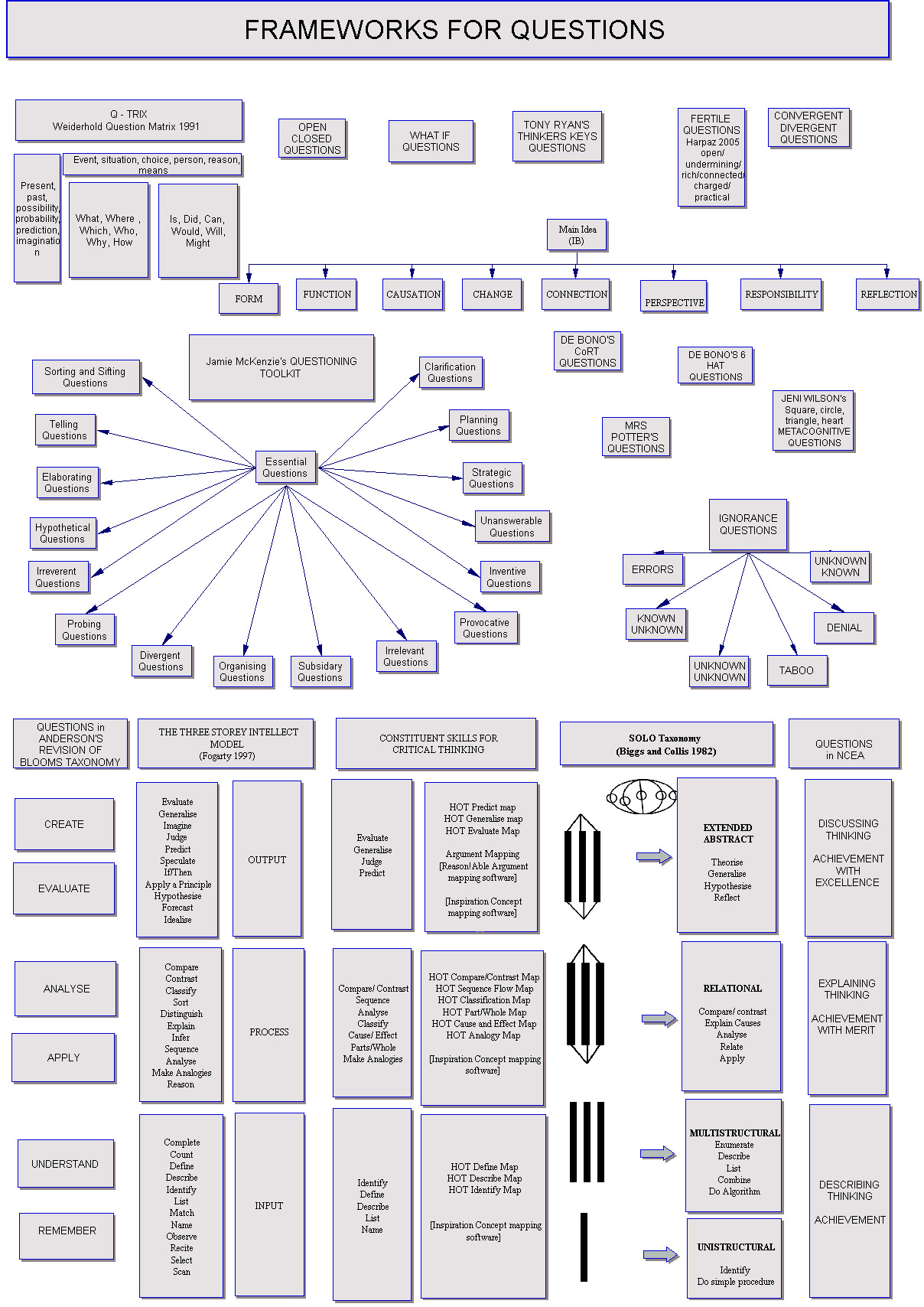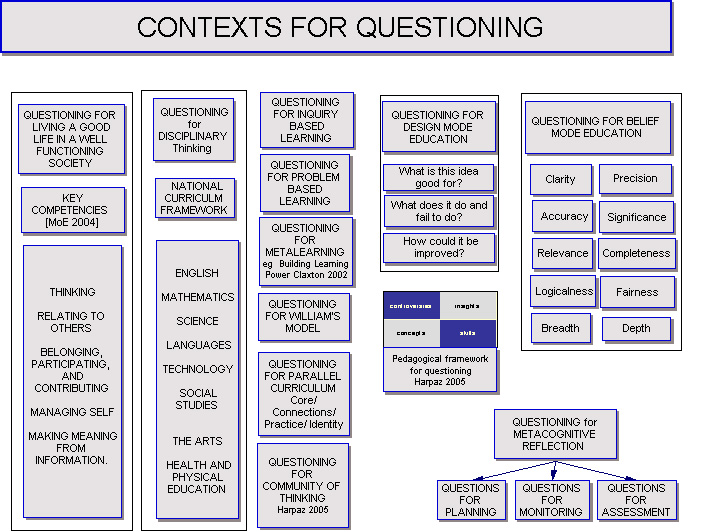Questions, questioning, questioners
Contents |
Questions, questioning , questioners

Toc
Once you have learned how to ask relevant and appropriate questions, you have learned how to learn and no one can keep you from learning whatever you want or need to know - Neil Postman and Charles Weingartner in Teaching as a Subversive Activity
Helping students become better questioners requires
- Frameworks for Questions
- Contexts for Questioning
- Dispositions for Questioners
The following overview is useful for schools and teachers planning how to develop a curriculum for better questioners.
.
Before teachers decide to use valuable curriculum time to develop questioning skills in their students it is important that they think about the how and why of their decision to value student questioning.
Contexts for questioning, invites educators to consider why they value student questioning, when in society and schools the questioner is seldom valued, and oftentimes marginalised as a trouble maker and maverick.
Next dispositions for questioners, acknowledges that no amount of explicit teaching of questioning frameworks in schools will make a jot of difference if questioning per se is not valued in the institution. It is time to model, model, and model questioning behaviours. Teachers are encouraged to select, introduce and sustain a learning disposition framework that will value questioning behaviours across their school community.
Finally in frameworks for questions, teachers are able to explore how student questions change with different question frameworks. Designing a questioning curriculum requires teachers to select a developmental sequence of frameworks that will build student expertise in questioning.
Downloadable Presentation pdf.
HOT SOLO Rubrics
Ask questions Rubric
| Extended Abstract | I can ask complex questions that go beyond the subject and make links to other concepts.
e.g. Generalise/predict/evaluate/create/imagine |
| Relational | I can ask questions that link information relevant to the subject
e.g. Sequence/classify/compare and contrast/part whole analysis/causal explanation/analogy |
| Multistructural | I can ask questions that bring in more than one idea relevant to the subject.
e.g. Describe |
| Unistructural | I can ask questions that bring in one idea relevant to the subject.
Closed questions – Who, what why, where when |
| Prestructural | I need help to ask a question |
Ability to question Rubric
| Extended Abstract | I can ask suitable questions that will give me different pieces of information and that will help me link my ideas AND will help me hypothesise, predict and evaluate in different contexts
I can gain information from a variety of sources (primary & secondary) |
| Relational | I can ask suitable questions that will give me different pieces of information AND that will help me link my ideas
I am willing to ask an expert when seeking answers |
| Multistructural | I can ask suitable questions that will give me different pieces of information
I can ask my teacher questions that help me gain information |
| Unistructural | I can ask a suitable question with help
I ask my friends and family |
| Prestructural | I can not ask a question |
Understanding of Thinking Rubric
| Extended Abstract | I am starting to question what I am told by my family and friends and I realise that other people have different points of view AND I can evaluate that information to make my own decisions |
| Relational | I am starting to question what I am told by my family and friends AND I realise that other people have different points of view |
| Multistructural | I am starting to question what I am told by my family and friends |
| Unistructural | I believe what I am told |
| Prestructural | Because my [teacher] said |
Asking Questions [in German] Rubric
Insert mp3 file of questions as exemplars
| SOLO Taxonomy | Success criteria |
| Extended abstract | I can make a [“When is you birthday?”] question in German, change this question to match the person I am asking AND add to/or modify this question depending on the response.
I can ask a [“When is you birthday?”] question in German to anyone, anywhere. |
| Relational | I can make a [“When is you birthday?”] question in German and change this question to match the person I am asking.
I can ask a [“When is you birthday?”] question in German to anyone in my school. |
| Multistructural | I can make a [“When is you birthday?”] question in German
I can ask a [“When is you birthday?”] question in German to people in my class. |
| Unistructural | I can make a [“When is you birthday?”] question in German by following the steps on a template.
I can ask a [“When is you birthday?”] question in German to my teacher and my friend. |
| Prestructural | I need help to make a question [in German]
I need help to ask a question [in German] |
Contexts for Questioning
Dispositions for questioners
Frameworks for Questions

| ||||||||||||||||||||||||||||||||||||
Copyright © Hooked on Thinking. Pam Hook and Julie Mills, 2004 to 2011. All rights reserved.
Unless clearly stated otherwise, copyright material contained on this site is the intellectual property of Hooked on Thinking, Pam Hook and Julie Mills.
You may not use this work for commercial purposes. You may not alter, transform, or build upon this work without the written permission of the rights owner.



